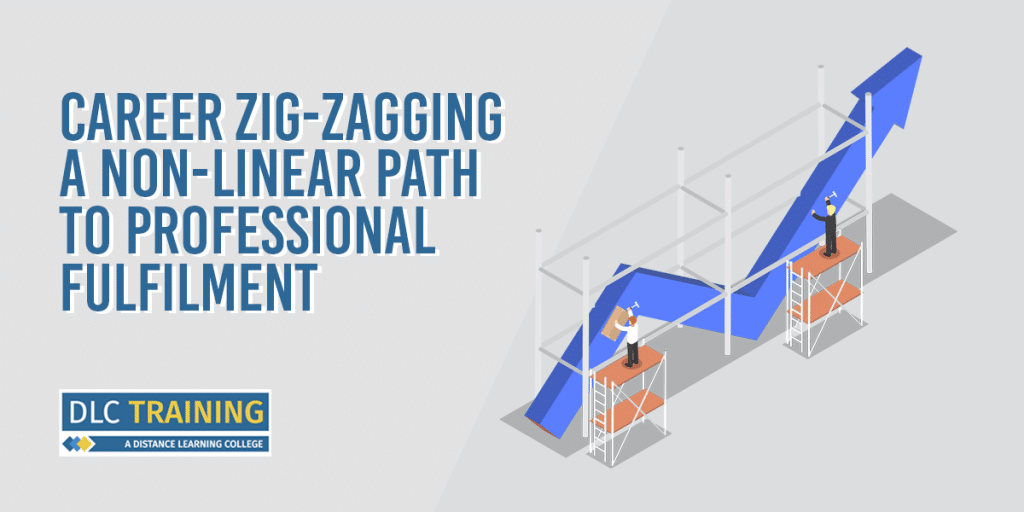In the traditional career model, people usually followed a linear path, steadily moving up within one company or industry. Today, the job market is very different. Now, people often switch industries and employers every 5 years. This trend is called career zig zagging. It means making intentional changes across different roles, industries, or even career fields. In this article, we will explore what career zigzagging is, its benefits, and why it is becoming a popular career strategy.

What is Career Zigzagging?
Career zigzagging involves making significant changes in your professional path. This includes moving between different roles, industries, or disciplines. Unlike a traditional career path, zigzagging includes lateral moves such as industry changes and role shifts. This approach recognises that career growth isn’t always vertical. Valuable skills and knowledge can come from many different sources and experiences.
The Evolution of Zigzag Career Paths
Several factors have contributed to the rise of zigzag career paths:
- Economic Shifts
- Technological Advancements
- Changing Work Values
- Gig Economy
Economic Shifts
The volatility of modern economies often requires professionals to adapt to changing job markets, leading to career shifts. Economic downturns, for instance, can result in job losses in certain sectors, compelling individuals to seek opportunities in more stable or emerging industries. Additionally, globalisation has intensified competition and altered the demand for various skill sets, prompting professionals to pivot and acquire new competencies.
Technological Advancements
Rapid technological changes have created new industries and roles, encouraging professionals to pivot in order to remain relevant. For example, advancements in artificial intelligence and digital marketing have created entirely new career paths that didn’t exist a decade ago.
Changing Work Values
Modern professionals, particularly Millennials and Gen Z, prioritise meaningful work, work-life balance, and personal growth over traditional metrics of success. Unlike previous generations, they are more inclined to seek careers that align with their personal values and passions. Consequently, they often favour job roles that offer a sense of purpose and opportunities for continuous learning.
Gig Economy
The rise of freelance and contract work has made it easier for individuals to explore different roles and industries. As the gig economy expands, more people are finding opportunities to diversify their professional experiences without the constraints of traditional full-time employment. Additionally, the flexibility offered by freelance and contract work allows individuals to balance multiple projects simultaneously, further enriching their skill sets.
Benefits of Career Zigzagging
Zigzag career paths offer numerous advantages for individuals seeking a fulfilling and dynamic professional life. Some of the key benefits include:
- Skill Diversification
- Enhanced Creativity and Innovation
- Increased Job Satisfaction
- Expanded Network
- Greater Marketability
Skill Diversification
Zigzagging enables individuals to acquire a wide range of skills by working in different roles and industries. This approach helps in developing a diverse toolkit that can be applied in various contexts, making them more adaptable and resilient in the face of changing job markets and technological advancements.
Enhanced Creativity and Innovation
Exposure to different industries and roles fosters creativity by allowing individuals to share ideas and approaches from diverse fields. This varied background also equips professionals to think outside the box and develop innovative solutions to complex problems.
Increased Job Satisfaction
Zigzagging allows individuals to pursue roles that align with their evolving interests and passions, leading to greater personal fulfilment. By changing roles and industries, professionals can also avoid the stagnation and burnout often associated with long-term positions in a single field.
Expanded Network
Career zigzagging helps individuals build a broad and diverse professional network across different industries and roles, leading to diverse influence and connections. This varied network can create unique opportunities for collaboration while also opening doors to new career prospects and ideas.
Greater Marketability
Professionals with diverse experiences can offer unique skills to employers, creating a unique value proposition that sets them apart. This can be very advantageous, especially in today’s competitive job market. Many employers appreciate the versatility and adaptability of individuals who have demonstrated success in different roles and industries. As a result, such professionals are often seen as lower recruitment risks and can expect to be rewarded as valued employees.
Implementing a Zigzag Career Strategy
To effectively embrace a zig zag approach to your career, focus on continuous professional development through ongoing education, such as online courses or other learning opportunities. Build transferable skills that are valuable across various roles and industries, like leadership, communication, and critical thinking. Joining recognised institutes such as IoSCM, CMI, ILM, CIPD, CIPS, and AAT will keep your industry knowledge up-to-date and provide development opportunities. Actively build and maintain a diverse professional network by attending industry events and engaging on platforms like LinkedIn. Stay open to opportunities and cultivate adaptability to navigate career uncertainties and build resilience to setbacks. Finally, incorporate self-reflection into your professional development by regularly assessing your goals to ensure your career moves align with your aspirations and values.
Overcoming Challenges With Career Zigzagging
At this stage, it’s important to consider not only the benefits but also the challenges you may face. Some employers might view frequent career changes negatively. Because of this, you need to be ready to explain confidently how your diverse experiences have helped you develop. Additionally, career transitions can lead to financial instability. Have a contingency plan in place to manage this risk.
To summarise, Career zigzagging is a dynamic and fulfilling approach to professional development. By embracing this non-linear career path, you can boost your creativity, and achieve greater job satisfaction while building a rich and varied skill set. Although it requires careful planning and a willingness to embrace change, the benefits make it a compelling strategy for navigating the modern job market. Whether you seek personal growth, increased marketability, or a more engaging career, zigzagging offers a pathway to a resilient and rewarding professional journey.
Learn how to prepare for a career change with DLC Training. Not sure where to start? You can also learn more about finding a job you love today.